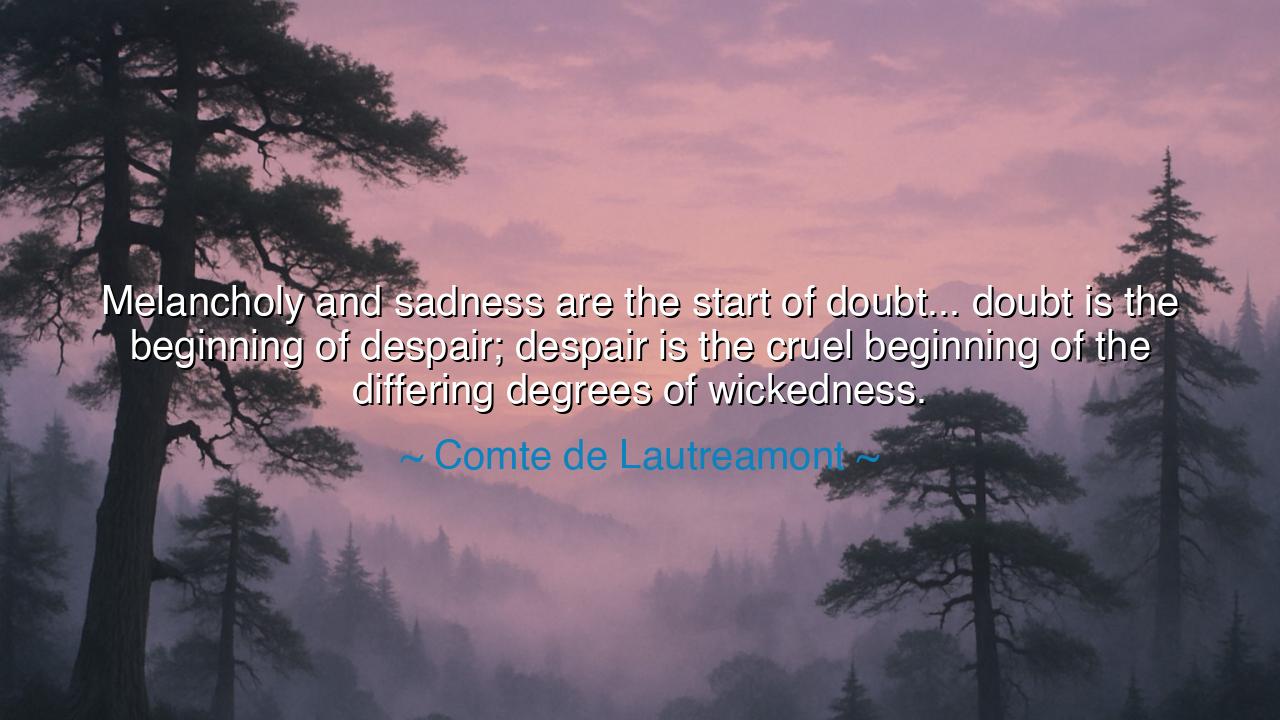
Melancholy and sadness are the start of doubt... doubt is the
Melancholy and sadness are the start of doubt... doubt is the beginning of despair; despair is the cruel beginning of the differing degrees of wickedness.






“Melancholy and sadness are the start of doubt... doubt is the beginning of despair; despair is the cruel beginning of the differing degrees of wickedness.” — so wrote Comte de Lautréamont, the mysterious poet of the night, whose words rise from the deep caverns of the human soul. Though he lived but briefly in the 19th century, his spirit spoke with the gravity of an ancient seer, warning mankind of the perilous descent from sorrow to corruption. His insight is not a condemnation of sadness, but a revelation of its danger — that when melancholy is left untended, it can poison the heart and twist the soul from its natural light.
The ancients, too, understood this dark progression. They taught that emotion, like fire, can warm or destroy depending on how it is mastered. Melancholy, in its first form, is gentle — the soft ache of reflection, the grief that refines. It can lead to wisdom, for the sorrowful heart often sees truths that joy overlooks. But if this sadness grows unchecked, if the soul lingers too long in its shadows, it begins to rot into doubt — doubt not of the world alone, but of goodness, of purpose, of oneself. And from that seed of doubt, the abyss opens: despair, the most suffocating of all emotions, where one believes that nothing can be redeemed.
History offers many examples of this descent. Consider King Saul of ancient Israel. In his youth, he was noble and anointed, chosen to lead his people. Yet melancholy took root in his spirit — the quiet jealousy, the fear of losing favor. That sadness turned to doubt in his own worth, and doubt to despair, until he could no longer bear the sight of his rival David’s success. In that despair, he committed deeds of cruelty and destruction, turning from the divine light that had once guided him. Thus Saul’s story became a living parable of Lautréamont’s words: how sadness, unhealed, may descend into wickedness.
But let us look deeper still. Why does despair breed wickedness? Because despair convinces the heart that nothing matters — that good and evil are alike in futility. The despairing soul no longer believes in redemption, and thus feels no duty to preserve virtue. In that emptiness, cruelty takes root — for where there is no hope, compassion withers. The man who no longer believes in light will set fire to the world, thinking it makes no difference whether it burns. This is the tragedy Lautréamont foresaw: that the spirit which succumbs to despair becomes a destroyer, both of itself and of others.
Yet, there is another path. For melancholy need not be our undoing — it can be our awakening. When sorrow first visits, it brings with it a choice: to sink into despair, or to transform pain into understanding. The Stoics of Rome spoke of this mastery — to feel grief without becoming its prisoner, to endure darkness without losing the will to act. The heart that accepts sadness but clings to hope becomes tempered, like steel in flame. It learns compassion, resilience, and courage — the very opposites of wickedness. Thus, what destroys one man can sanctify another.
So, my child, heed this teaching of the ages: when sadness comes, as it surely will, do not feed it with bitterness or self-pity. Name it, face it, and then rise above it. When doubt whispers, answer it with faith in something greater than yourself — in goodness, in purpose, in love. And when the shadow of despair falls upon you, remember that even the longest night cannot hold back the dawn. For the chain that Lautréamont describes — from melancholy to wickedness — is not fate, but warning. It is the path we take when we stop believing that healing is possible.
Therefore, guard your heart with awareness. Let your sorrows refine you, not consume you. Seek wisdom in sadness, but never worship it. And when you find yourself in the darkness of despair, light even the smallest candle — a word of kindness, a prayer, a song, a step toward truth. For it is in that single act of defiance that wickedness loses its hold, and the soul, once threatened by ruin, becomes once more a creator of good.






AAdministratorAdministrator
Welcome, honored guests. Please leave a comment, we will respond soon